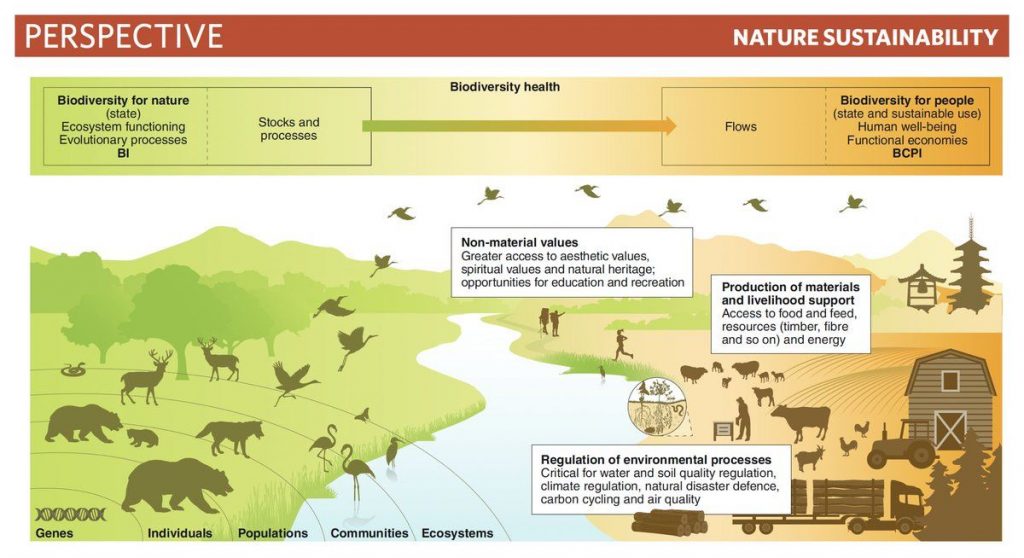News
Towards a policy-smart and multidimensional biodiversity measure

News | Aug 2021
A new paper calls for a new framework for measuring biodiversity and its contributions to people with an eye towards greater conservation.
Research published today in Nature Sustainability presents a new Multidimensional Biodiversity Index (MBI) to connect biodiversity science to the political agenda.
Biodiversity is highly complex. It is a multidimensional concept in the same way that poverty, sustainable development or human health are. The authors of this new paper discuss that it is possible to have an adaptive and comparable measurement approach that can help policy around the world to tackle the biodiversity loss crisis. The MBI is a holistic measure that accounts for the diversity of values underpinning nature–human relationships.
Biodiversity underpins the health and strength of ecosystems and their contributions to people, from food security to disease control. However, the complexity of nature’s systems and the variety of narratives on why biodiversity matters mean that the information made available to policymakers is not always clear. This research discusses that the difficulty of linking biodiversity loss and risks to the attainment of sustainable development is a barrier to urgent action to reverse biodiversity loss.

According to the authors, taking a multidimensional approach to biodiversity – to assess what we value, facilitate mainstreaming and support national decision-making – helps to clarify the many linkages between biodiversity and society. They propose that national governments use a policy-focused MBI that incorporates ecological and human-centred perspectives on biodiversity. The proposed adoption of a composite index on biodiversity follows the success of indices in other sectors, which are used to assess complex societal issues such as human development, or the economy. These indices are tools to support policy analyses, advocacy and social awareness. A well-known example is the Human Development Index (HDI). Despite the shortcomings of any single measure of complex issues such as human well-being or the state of biodiversity, discussions around agreed-upon metrics can leverage political action and societal advocacy, reshaping our understanding of sustainable development.
Carolina Soto-Navarro, UNEP-WCMC, and lead author of the paper, affirms:
‘A clear example is GDP, arguably the world's most powerful indicator of national wealth. Nowadays, there is greater acceptance that GDP is a flawed metric, which has engrained in our society an unsustainable growth-centered vision of progress. But we cannot dispute its impact and power to leverage political action and mainstream economics into the political agenda. We are exploring a similar approach for biodiversity. We are not discussing MBI as a target, but as a thermometer that governments can use to take the pulse on nature’s health. Our question is, can we put biodiversity at the forefront of political decisions and achieve a similar level of impact with a framework to measure biodiversity?
This research posits that similar levels of engagement at the political level might also be generated through the creation of an MBI that is used alongside these other multidimensional indexes. Such an index could be part of a dashboard of measures to drive sustainable development that delivers better outcomes for people and nature.
The paper presents the MBI as the ‘nature component’ of integrated policy decisions on sustainability; and it offers a roadmap for using the index at the national level as a biodiversity knowledge product for evidence-based decision-making.
Neil Burgess, Chief Scientist at UN Environment Programme World Conservation Monitoring Centre (UNEP-WCMC), argues:
‘An index like the MBI can be developed and taken up by national institutions, as a means to place biodiversity values on an equal footing with macroeconomic indicators, which drives so much decision making globally’.
UNEP-WCMC leads the MBI research project, funded by the Swiss Federal Office for the Environment (FOEN). The development of a multidimensional biodiversity index is supported from its inception by the Luc Hoffmann Institute. The research is currently focusing on developing the conceptual and methodological framework and piloting the concept in four focal, pilot or pioneer countries (South Africa, Viet Nam, Mexico and Switzerland) to assess its feasibility. One of the main challenges will be to align the elements of the national index to the values people hold on and derive from nature in that specific socio-cultural context.
Unai Pascual, Research Professor at the Basque Centre for Climate Change, co-Chair of the IPBES Values Assessment and Lead Author of the Global Assessment, says:
‘A significant challenge in the quest for a more sustainable and fair future is the fact that while nature is associated with a great diversity of values, we still lack a practical policy relevant indicator for biodiversity that considers both the ecological and social value dimensions in a balanced way, and the MBI approach is a step in addressing this issue.’
Towards a multidimensional biodiversity index for national application was written by experts from UNEP-WCMC, CBD Secretariat, IPBES and the Comisión Nacional para el Conocimiento y Uso de la Biodiversidad (CONABIO).
Have a query?
Contact us
communications@unep-wcmc.org
